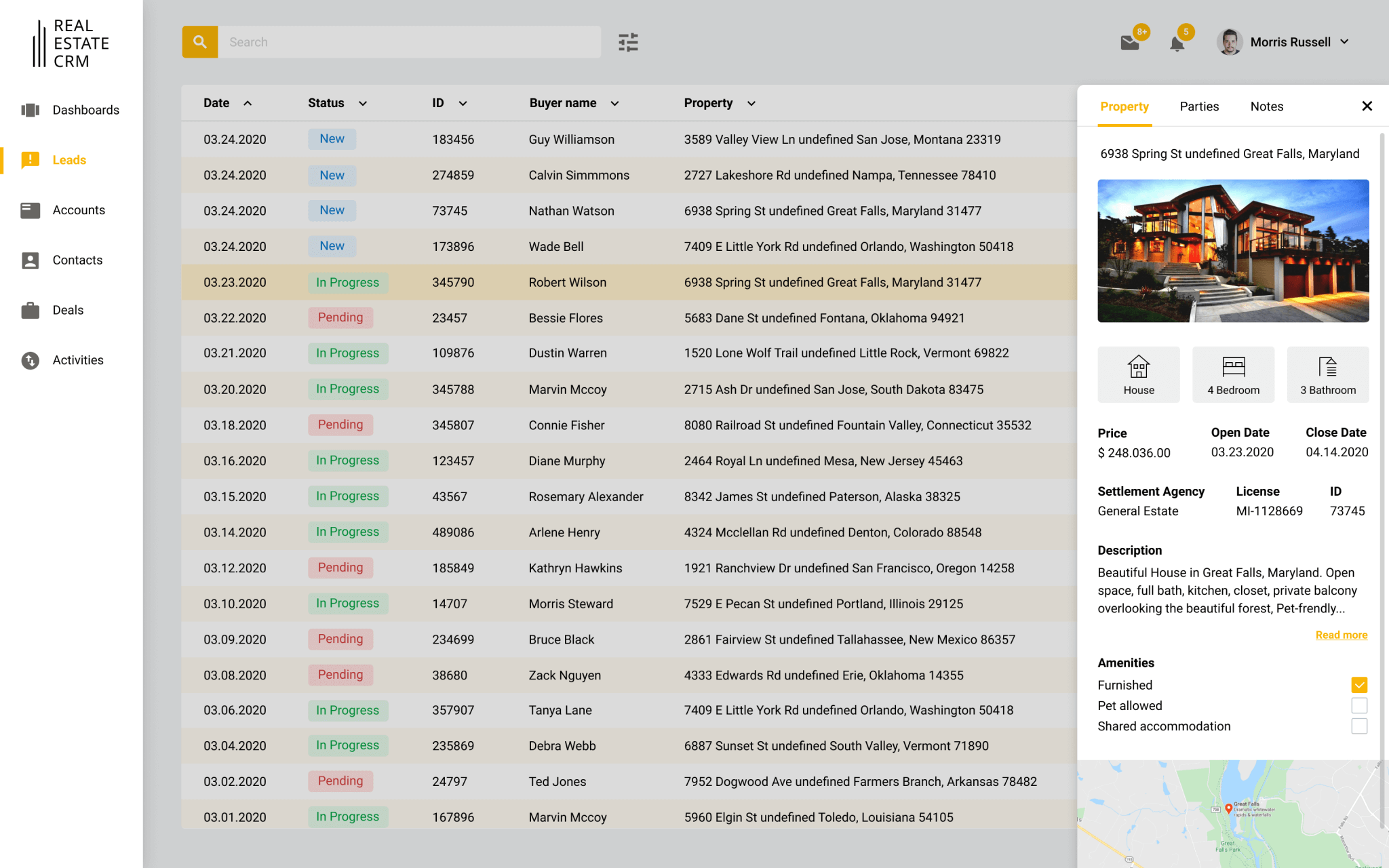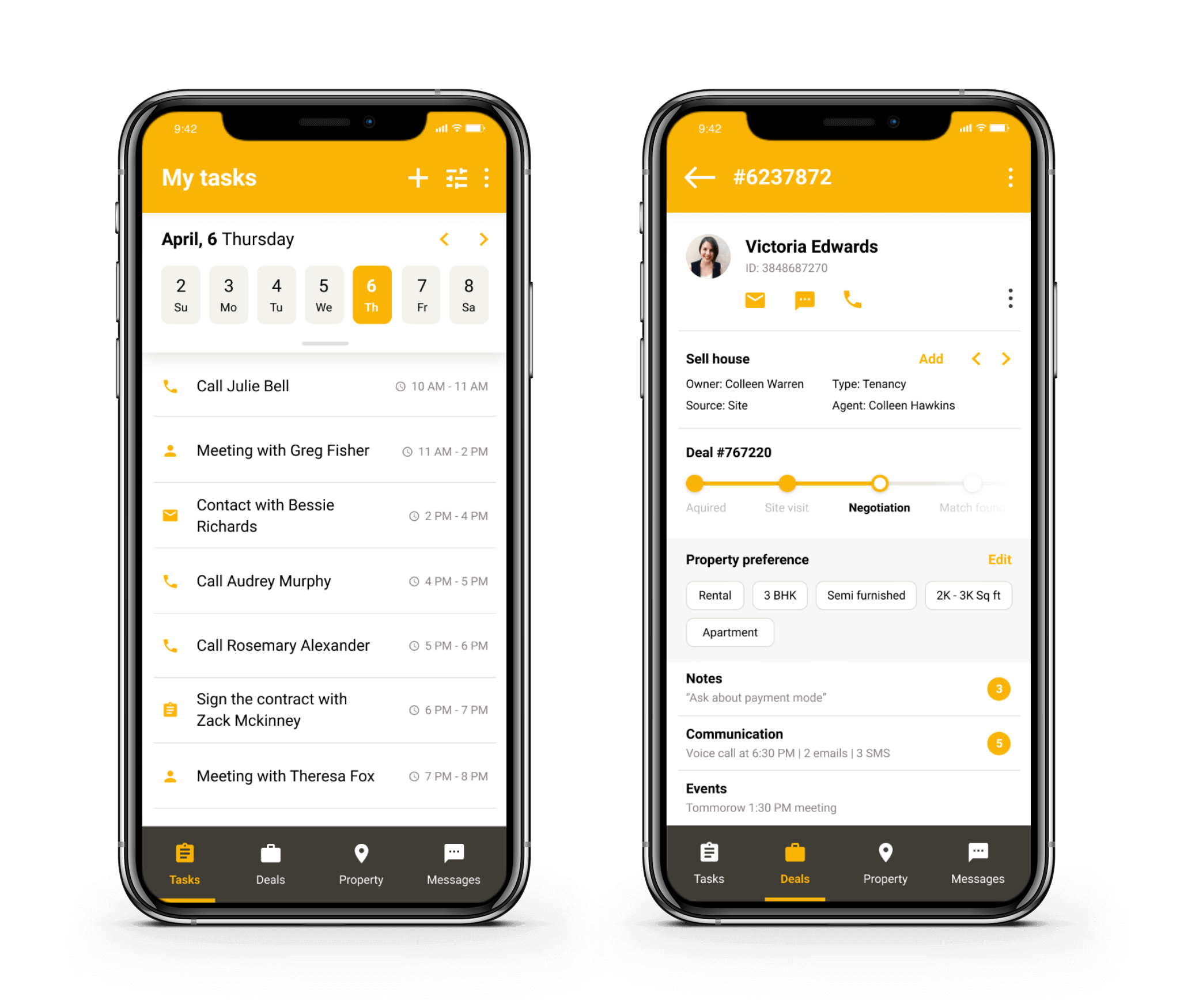Today, it’s hard to imagine a successful real estate company that hasn’t a real-time 360-degree vision of its every client. If you sell, say, wood screws, you know that what your clients want is some good old wood screws. Ask them what size they want and which quantity will satisfy their needs — and the deal is done! In real estate, everything is way more complicated.
Every potential client of a real estate company has dozens of preferences that you should keep in mind. Some of the clients are looking for luxury housing, while others are in search of something affordable. The number of rooms, the view from the window, neighborhood, and dozens of other factors should be considered if you want to make your clients happy. A vast number of records generated by each customer can’t be tracked and analyzed by a real estate agent efficiently. At the moment, it’s hard to say if there’s a more effective solution for described issues than a custom-made CRM system. Today, well shed some light on how such software can improve your productivity, increase sales, and improve customer relationships.
How CRM Systems Can Help Your Real Estate Business
The functions that CRM systems for real estate business provide can be divided into three groups:
- Features that allow real estate agents to deal with leads, prospects, and existing clients;
- Reporting and analyzing tools for real estate company management to estimate the efficiency of agents;
- Relationship development features.
Let’s take a look at them in more detail.
Quick Access to Clients’ Data for Real Estate Agents
Real estate CRM systems help to ensure that all the client information, such as buying history or contacts, is easily accessible and well organized. Imagine that you have to keep in mind all upcoming meetings, payments, available houses, contacts, and other information. It can be quite tricky if at all possible to juggle all these pieces of information in your head without hesitating every time a client wants to clarify the info on available houses in a specific price range. A combination of sticky notes and Excel tables can simplify the whole thing, but such an approach is quite far from perfection.

CRM systems for real estate business can automatically collect all incoming data and show how your relationship with a client is developing. When a client fills out a form trying to find a suitable offer, all this information can be uploaded into your CRM. Such info may include search queries, filtering parameters used, the houses that attract the most attention, price range, and dozens of other parameters. All the data related to your leads gathered from any source, be it a website or a mobile application, will be stored securely. Your CRM will enable easy access to these records for every employee with the appropriate access rights. During all further communications, this data can be automatically updated to help you track and analyze the whole process step-by-step. Also, the use of cutting-edge technologies allows custom development companies to implement predictive features helping you to determine when specific customers are ready to buy or rent a property.
Real Estate Agents Efficiency Estimation
To meet your goals, you must know how well your real estate agents perform, what business processes have the most significant impact on the overall productivity, and what areas require your attention. With a real estate CRM system, you can rely on smart reporting tools that will provide company managers with a clear vision of the current state of affairs. Revenue metrics presented in an intuitive way can be grouped by different criteria such as property buying, property selling, the agent in charge, and many others. With all this information before your eyes, you can identify inefficient marketing campaigns, assess the productivity of your agents, and make changes to your business strategy.
Relationship Development
Built-in automated communication tools can improve conversation with the clients and help to build more solid relationships with them. Automated follow-up emails, reminders, live chats, and other communication channels can provide speed feedback and avoid mistakes while entering the client’s contact information. You can’t stay in touch 24/7. Advanced communication tools could be a decent solution that won’t let your clients feel abandoned. Automated emails can provide the most current information on new offers, and chatbots can guide clients through your knowledge database to help them find the right answers. Such an approach will let your clients know that you care about them and do your best to improve their experience of collaboration with your company.
Now, let’s see what list of features a well-built CRM system should provide to guarantee the best possible outcome for a real estate company.
Must-have Features for a Real Estate CRM System
The actual list of features provided by a custom-made CRM system for the real estate sector may vary according to the needs of a particular company. The thing is that, unlike off-the-shelf software, custom-made solutions are built to meet the needs of a specific customer. Therefore, custom CRMs reflect the features of the work of a particular company. Nonetheless, the functionality described in this chapter can help any company to benefit from adopting a CRM system.
Deal management functions help to track sales during the different stages of the deal. Detailed information related to every made deal is stored in the CRM system and can be accessed by users at any time. Analyzing features can help with planning the sales process and extract insights for further improvements.
Real-time communication channels make clients feel that you care about building strong relationships with them and always ready to answer their questions. CRM systems for real estate business may include integrated chats that help to facilitate communication with customers. Some CRM developers go even further and offer the development of real-time chatbots that can answer frequently asked questions without involving any employees. In any case, communication tools will help you to reply to clients’ requests, share the most relevant information, and provide info on new offers as soon as they appear on the market. Also, the history of clients’ activity can be saved and analyzed for developing communication guidelines for real estate agents.

CRM can decrease the time required for creating and sharing documents with clients thanks to the document flow automation feature. A module that takes care of the lion’s share of routine paperwork is a good help in achieving excellent productivity without losing in quality. A simple example of how a CRM system can help you with document management is the ability to choose a template with a predefined design and layout to create a new document, share it among your colleagues or clients, and attach to a particular deal with a couple of clicks.
To stay in touch with your clients, you should make sure that your contact management process has no weak points. Building strong relationships with a client is a long-term task. Any mistake made along the way can cause some negative consequences. An effective contact management system offers something more than just a possibility to find an email of a certain client. Additionally, CRM for real estate companies provides easy access to communication history, deals details, interactive reports, and other information.
A client portal is a place where a potential client makes the first impression of your company. If the impression is good, the client may want to deepen cooperation. At this point, you have to ensure that any client, be it a landlord, home buyer, or renter, can get easy access to meeting scheduler, share information, and monitor transactions. Offers and requests that clients send to the portal can be automatically analyzed by the CRM system to provide you with an overview of current supply and demand in the real estate market.
Marketing automation tools help real estate agents to develop and track campaigns and routine tasks. To stay in touch with the clients, you can create personalized emails and organize email campaigns.
With so many variables involved in the work of a real estate company, it may be pretty hard to define how the specific factor affects the overall performance. Fortunately, CRM systems provide smart reporting functions that enable the generation of interactive and intuitive reports. Visualization of such metrics as conversion rates can simplify the understanding of the efficiency of currently used business strategy. A clear picture of your performance and your clients’ activity will help you understand how good you are in achieving your goals and what should be your next target.
Custom CRM developers constantly adopt new cutting-edge technologies to provide real estate companies with breakthrough functionality. The extensive use of AI has provided access to functionality, allowing real estate companies to achieve a completely new experience. Predictive analytics, for example, will enable you to use the available data to forecast future market trends. Analyzing search queries and online breadcrumbs left by users, such systems can predict the future behavior of people who have interacted with property or just planning to do it. Before contacting a real estate agent, home buyers and sellers prefer to search available properties online. Tools for predictive analytics allow using this data to reach your potential clients with the right message at the right time.
Route optimization tools can significantly simplify the planning of your work schedule. If you have to visit it a dozen real estate properties per day, each at a specific time, building the optimal route may become a real headache. With a real estate CRM that supports route optimization features, there’s no need to keep in mind a bunch of names, addresses, and phone numbers. Since your CRM already contains all the contact information, all you have to do is to choose with whom you want to meet today, and the system will build the optimal route for you.
AR and VR can also find their place in the world of real estate business. If you want to demonstrate some available options to your client, there’s no need to visit them all. With a virtual reality headset and specialized software, you can organize virtual house tours. Augmented reality is another option of presenting real estate properties to your clients. This technology allows accurately visualizing large buildings as interactive 3D models. Moreover, when you show apartments to a client, you can adjust the style and furniture in real-time.
Conclusions
When the task includes the number of variables that can’t be analyzed by a human mind, the use of specialized software is required. The real estate business is a dynamically evolving environment in which it’s too hard to operate without automating some routine activities. Handling all clients’ information manually, you risk stealing your own time that you could spend on developing a more effective business strategy.
Custom-made CRM systems provide dozens of automation tools that can take care of your daily tasks. The best part about CRMs in real estate is that besides being time-saving machines, they can help you to increase sales and build strong relationships with your clients.
At XB Software, we have broad experience in creating custom solutions for the real estate sector. Our business analysts know what typical issues a real estate company faces every day. Additionally, an in-depth analysis of your company will help us to find some unique problems caused by the peculiarity of your business specifically. Constant collaboration with the client during the whole development life cycle is one of our major priorities. Such an approach allows us to make adjustments to the development process according to our clients’ requirements. To learn more about our approach to CRM development and receive a free consultation, feel free to contact us.